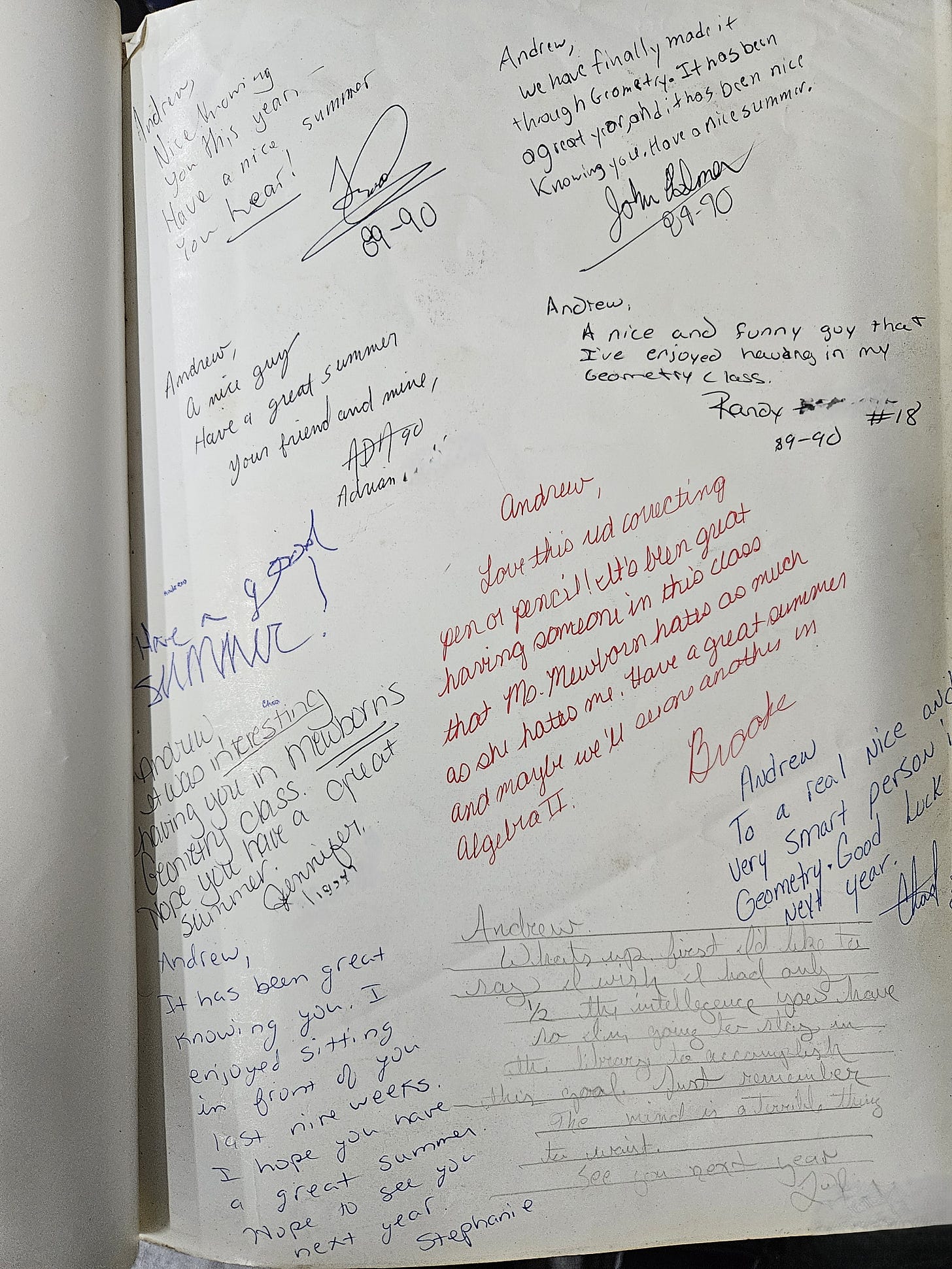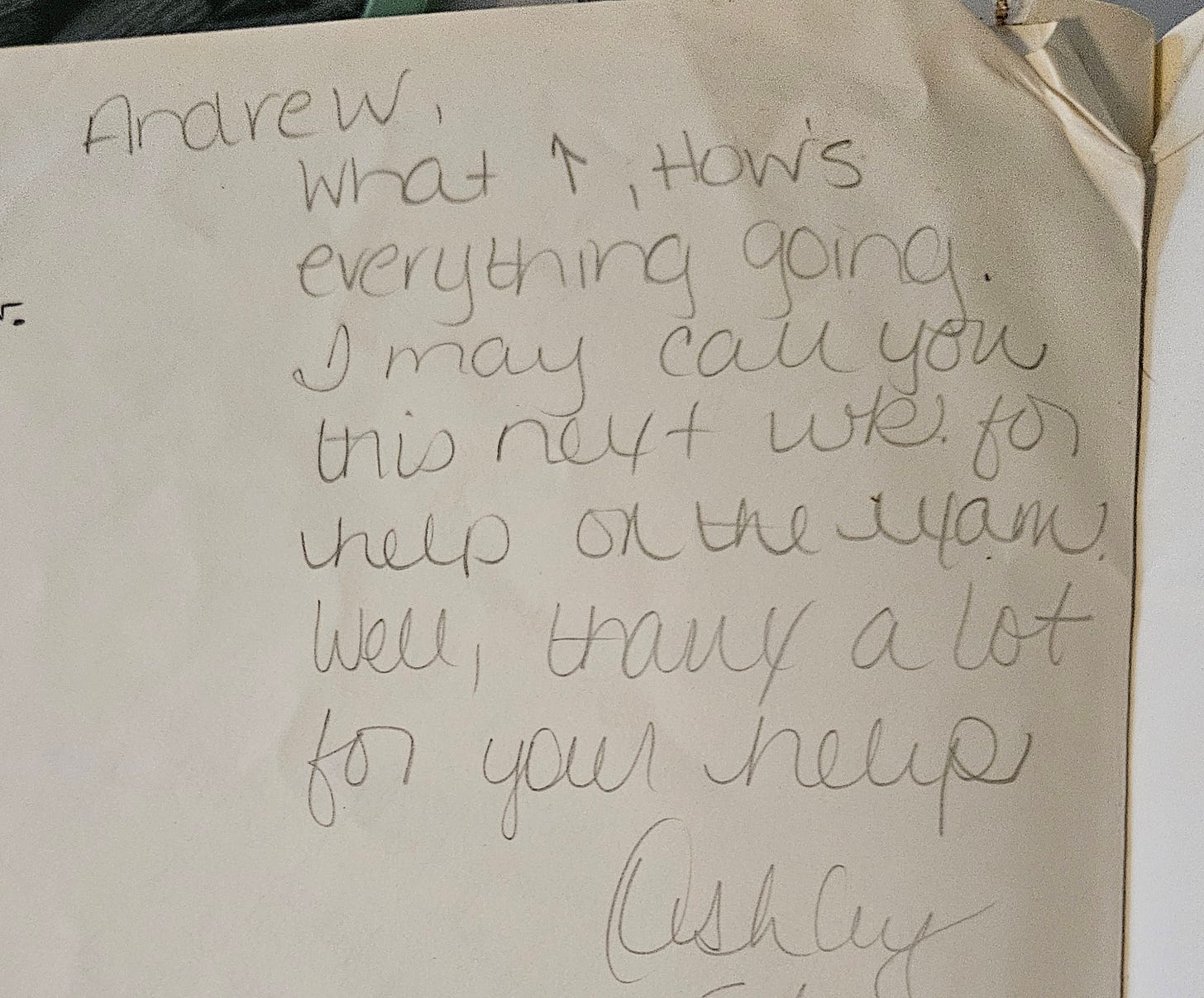I remember plugging away at algebra in middle and high school. We would try to figure out what x was in lots of different and clever ways, and even as a young tyke, I could appreciate how slick the system had become over the centuries.
In spite of this appreciation, it was still sort of mind-numbing for me. What I mean is that it all seemed very abstract, without any real connection to the real world—except for being able to give an answer to a problem, of course. There was something about just pushing around symbols that made it seem more like a mental exercise than something useful.
I don’t want to give you the wrong idea about young Andrew. He was definitely capable of manipulating abstract symbols in his head with algebra, but it seemed really boring and tedious, and there didn’t seem to be much point to it, other than the desire to do well in school.
Then came geometry. What a difference!
Instead of memorizing formulas, there was a shape you could visualize in your mind. You could use what I thought of as common sense to understand why things worked out the way they did, and the great thing is that most of this stuff was just so obvious to me. There was something about the visual and abstract elements coming together just right.
During my 9th grade geometry class, I ended up tutoring two kids who were a year older than me. This was definitely a new experience for me, to go into the homes of these sophomores as a freshman. As an awkward 9th grader desperately trying to reinvent myself, these older kids actually wanted me in their homes.
That seemed odd, too. Being a nerd was supposed to get you ostracized, at least according to the crude set of rules I had formulated during my three-year sentence at middle school. Here I was, though, doing the nerdiest of things: helping someone at math.
This wasn’t the first social paradox I had noticed, but I think it’s notable because it gave me validation that I could use my intellect to seem cool. I desperately wanted to fit in, but mainly to avoid the ostracism and isolation I had felt previously.
Seeming cool was one way to do this. Maybe shutting up and being a quiet kid could have worked, too, but that wasn’t who I was. I had to make this cool thing work with my own quirks, or not at all. It definitely worked in Geometry class, even though I can also get a sense of how annoying I was by reading my high school yearbook from my freshman year.
Check out Brooke’s comment, where she says it’s nice to have someone the teacher hates as much as her:
The other comments are very complimentary, and I’m pretty sure that’s because I had a really easy time in the class due to the cool factor. If you read through the pages of my yearbook from other classes, there’s a great deal more about how disruptive and immature I was in class. Geometry was different.
One of the people who signed my yearbook there is Chad. Chad was more than a year older, and he had an El Camino he could drive at night. Driving at night meant he was over 16 years old, and I had just turned 14 at the start of my freshman year.
One evening when it was dark outside, Chad drove over to my house to pick me up. I think he lived in our neighborhood, but it was far enough so that it made sense to drive there. He drove an El Camino, or at least that’s how my memory is reconstructing this today.
On the way to his house (or back to mine), I was in the passenger seat with my seat belt on. Chad had overshot his turn or something, so he put his car in reverse instead of turning it around, and he kind of gunned it. Within a few seconds, we were probably going around 40 miles per hour in the ‘hood.
My heart was already racing when a neighbor angrily rushed over to Chad’s car to chastise him for driving that way. Chad took it like a champ, receiving the wisdom that there were kids running around in this neighborhood and that he should slow down with the good grace that only comes about when you’re hoping to avoid getting into serious trouble.
I know I helped Chad a lot that year, but he also kind of helped me by welcoming me into the cool kids’ club. It sounds so trivial today, but the truth is that psychological well-being matters a tremendous amount to kids, and avoiding social ostracism—especially as you enter puberty—becomes the most important thing in the world, at least at times.
I was now El Camino cool, thanks to Chad.
There’s one other person I tutored that year, and she actually lived at the end of my street, so I could just walk over there—no reverse El Camino roller coasters necessary. Ashley was shockingly good looking, like something out of a movie about an attractive older girl in your geometry class who turns virtually every head in your high school.
Here’s Ashley’s entry into my yearbook:
Somehow, I had used my brain to get into the cool kids’ club, at least temporarily and with a few select people. Other freshman in that class knew I was hanging out with the very cool older kids.
I’m not at all convinced that I was the smartest person in this class, nor that I was even necessarily top tier. There were literally thousands of kids at my high school, and some of the kids in my more advanced classes almost seemed like they were from another planet. They were intellectual titans with rigorous discipline, and by contrast, I had some really bright spots here and there.
I think I got to tutor these kids (and, more importantly, gain cool cred) precisely because I was so emotionally immature. I was prone to outbursts in class, and I didn’t have any inhibition whatsoever to raise my hand any time Mrs. Mewborn asked a question about how to calculate area or something.







I need to know what happened to the person who drew themselves lines to write straight and also "...mind is a terrible thing to waist'
All I know is that “kids these days” are missing out. They NEVER sign each other’s yearbooks (and only get them because their parents insist that they have one. When I should mine to my sons, they couldn’t read most of it, not because of poor penmanship, but because it was in cursive 😆 I tell ya, cursive will be the way some war will be won because most people won’t be able to read the “coded” messages!